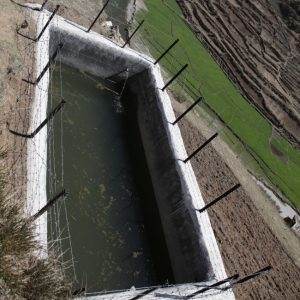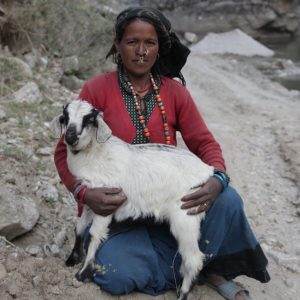This was my first trip to Karnali, a region yet to be explored, where I observed several interventions made by the BICAS project and met with a number of community people and civil society organisations who were benefitted from the interventions. The interventions ranges from gravity goods ropeway to solar water lifting, goat breed improvement to agriculture commercialisation, improved water mills to micro-enterprises and capacity building of CSOs to linkages with local government. Most of the initiatives were new to me as a staff from Finance.

Babulal Regmi at the small irrigation scheme supported by BICAS project. Photo: Practical Action/ Upendra Shrestha
When we arrived in Galje, Kalikot a farmer a Babulal Regmi, was excited to show his vegetable farm where we could observe many farm activities going on. Vegetable farming in this area was not practised earlier. With the small irrigation scheme supported by BICAS project, he was able to irrigate around 25 ropanies (3.14 hectare) of land which belong to 14 farmers in the same group. The cabbage produced in his small patch of the land was just sold for NPR 10,000 (1 USD = NPR 110). In the same plot he used to produce paddy and could hardly earn NPR 2,500. This was simply an example of how people are increasing income by changing their farming practices. Mr. Regmi was happily serving as a barefoot agro-vet and helping fellow farmers and earning an additional income in return.
Mr. Regmi and one of the farmer members were in a hurry to go to the nearby market to get the vegetable seeds for the next round of vegetable farming. Both of them were excited to share the future plan of the farmers’ group as they learned during training. His kids are grown up pursuing higher education with the contribution of the increased income which was not possible without BICAS project, he proudly said.

Lift irrigation system in Jumla District. Photo: Practical Action/ Upendra Shrestha
Tila River has been flowing since centuries alongside of their villages but they had to depend upon monsoon to plant their crops. It was their far dream to plant seasonal/ off-seasonal vegetables. The grid electricity connection can be achieved only in next generation. Now, the faces of farmers are brightening as they have lift irrigation system run by solar power from the Tila River in Jumla District. Nara Bahadur Rawat, a resident of Ranka, Jumla was in hurry to show the reservoir tank constructed for irrigation. They have started to grow seasonal/ off-seasonal vegetables and irrigate apple orchards which are one of their main income sources in this area. At first they didn’t believe that this technology would work and change their lives. Now it has turned into reality, thanks to BICAS project, they said. We met the representatives of local government and came to know that they have allocated funds to replicate this technology in other areas which made us gratified.

Gaukala Budha is happy to have hybrid baby goats. Photo: Practical Action/ Upendra Shrestha
Finally on the last day of the trip, we managed to observe BICAS project’s support in goat breed and shed improvement. We saw a lady, Gaukala Budha, coming towards us smiling. She wanted to show us the Boer buck (breeding buck) but she was regretting that as the buck is now adult she could not bring it to us. While trying, the buck hit on her right arm and she was feeling the pain, but was still happy to explain how the Boer buck support has changed in her income. The Boer buck, supported by the project is now adult and providing breeding service to goats of fellow villagers. She showed five small hybrid baby goats, crossed with the local breeds which were growing very fast compared to the local breeds. Within a year of service, there are already 13 hybrid baby goats in the village. Gaukala is receiving service charge from the villagers either in cash or equivalent grains. She is happy to have hybrid baby goats and to provide such service to the villager which has provided her extra income.
Gaukala also showed us the improved goat shed supported by BICAS. Her smiling face was telling us that BICAS project came up with unexpected boon for the smallholders farmers like Mrs. Budha in Karnali.